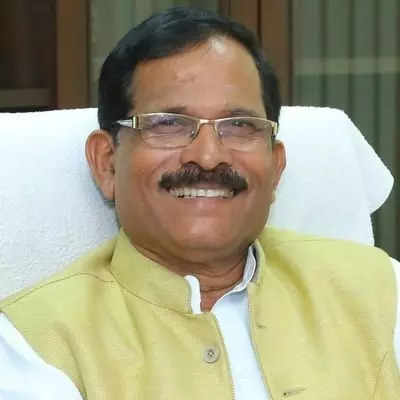
By Shripad Yesso Naik
As the world eagerly anticipates the upcoming G20 Tourism Ministerial Meeting under India‘s presidency, the spotlight shines brightly on the captivating and vibrant realm of cruise tourism. Cruise tourism, often regarded as the pinnacle of vacation experiences, offers an irresistible allure for travellers seeking a unique and memorable journey. It involves embarking on a multi-day or multi-week adventure aboard a large passenger vessel, navigating the vast expanse of the open sea or serene inland waterways.
These voyages encompass a delightful combination of breathtaking destinations, immersive cultural experiences, and an array of onboard activities, including fine dining, world-class entertainment and unparalleled relaxation. With millions of people embarking on cruises each year, cruise tourism has emerged as a significant sector within the global tourism industry, acting as a catalyst for economic growth and providing a gateway to exploration and luxury.
At the heart of the remarkable growth of cruise tourism lies the increasing demand for luxury experiences. Modern travellers are no longer satisfied with conventional vacations; they seek extraordinary and personalised journeys that create lasting memories. This pursuit of exclusivity and uniqueness has propelled the popularity of high-end cruise ships, which offer an extensive range of luxurious amenities and activities. From lavish accommodations to Michelin-starred dining, from Broadway-style shows to rejuvenating spa treatments, these floating marvels provide a sanctuary of indulgence and refinement on the high seas. The growing appeal of luxury tourism, facilitated by high-end cruise ships and luxury cruise lines, is anticipated to further augment the cruise tourism market share in the years to come. As travellers continue to prioritise remarkable and unforgettable experiences, the trend of seeking out unique travel adventures will persist, solidifying the position of cruise tourism as a prominent player in the global travel landscape.
Beyond its allure and opulence, cruise tourism has the potential to serve as a model for responsible and sustainable travel. The collaboration between cruise lines, ports, and destinations plays a pivotal role in maximising the benefits of tourism for local communities. By establishing ship arrival and departure schedules years in advance, cruise lines provide destinations with invaluable advance information about tourism flows, enabling effective planning and management of resources.
Furthermore, the majority of cruise passengers participate in shore excursions organised by the cruise lines in partnership with local providers. This collaboration ensures that local economies thrive as tourists engage with authentic cultural experiences and support local businesses. By embracing collaborative and sustainable tourism initiatives, led by the cruise industry, destinations, ports, community organisations, and stakeholders, we can achieve mutual objectives of preserving the integrity, cultural heritage, and natural beauty of the world’s most treasured destinations for future generations.
In recognition of the immense potential of cruise tourism, the Ministry of Tourism, Government of India, has taken proactive steps to harness this opportunity. As part of the 4th Tourism Working Group Meeting under India’s G20 Presidency, the ministry is organizing the “Cruise Tourism” event.
This esteemed gathering will bring together G20 member countries, invited nations, and industry stakeholders to deliberate on strategies for promoting cruise tourism as a model for sustainable and responsible travel. It serves as a platform for knowledge exchange, highlighting India’s efforts in developing and promoting cruise tourism. With its extensive and picturesque coastline, pristine forests, tranquil islands, and rich historical and cultural heritage, India possesses the ideal ingredients to emerge as an exceptional cruise tourism destination.
In line with this event, the Indian cruise tourism industry has set ambitious goals to increase cruise passenger traffic from the current 0.4 million to four million, with an expected economic potential growth from USD 110 million to USD 5.5 billion in the future. To support this ambitious growth, the Government of India has implemented various initiatives, including infrastructure upgrades, rationalisation of port fees, elimination of ousting charges, granting priority berthing to cruise ships, and providing e-visa facilities.
These measures aim to create a favourable business environment, enhance infrastructure capabilities, and position India as an attractive destination for cruise lines and travellers alike.
As the “Making India a Hub for Cruise Tourism” event takes centre stage during the 4th Tourism Working Group Meeting, the focus will be on addressing the challenges and opportunities for developing cruise tourism in the country while adhering to the principles of sustainability.
The event will serve as a platform for engaging discussions on the coastal, island, regional, and yachting facets of cruise tourism, capturing perspectives from coastal states, private and public stakeholders in inland waterways, and representatives from riverine states. By fostering collaboration, sharing best practices, and aligning public and private sector efforts, the event aims to accelerate the development of cruise tourism in a sustainable and responsible manner.
Key states, union territories, industry stakeholders, and national and international experts will come together to chart the course for India’s cruise tourism journey, ensuring the preservation of cultural heritage, promoting economic growth, and creating a memorable experience for travellers.
As the vibrant state of Goa prepares to host this momentous event, its natural beauty and rich cultural tapestry set the stage for a remarkable cruise tourism experience. With its pristine beaches, historic landmarks, and warm hospitality, Goa has long been a favourite destination for travellers seeking sun, sand, and serenity. The event will showcase Goa’s potential as a gateway to unforgettable cruise voyages, offering a blend of coastal charm, cultural immersion, and a wide range of activities and attractions. From exploring the architectural marvels of Old Goa to indulging in water sports and beachside relaxation, Goa promises an enchanting experience for cruise travellers.
As the curtains rise on the G20 Tourism Working Group Meeting, the anticipation surges. The enchanting coastal state of Goa, renowned for its breathtaking coastlines, vibrant culture, and unwavering commitment to sustainability, stands poised to embrace the transformative journey of cruise tourism. Goa, with its diverse destinations and vibrant local communities, is ready to captivate cruise travellers from around the globe. By showcasing its rich cultural heritage, pristine beaches, and awe-inspiring landscapes, Goa will leave an indelible mark on the hearts and minds of those who set foot on its shores.
In the realm of cruise tourism, a voyage of luxury, sustainability, and economic growth beckons. With the forthcoming G20 event and the collective efforts of industry stakeholders, policymakers, and local communities, India is set to become an exceptional cruise destination. Its diverse landscapes, cultural richness, and warm hospitality will captivate discerning travellers, leaving them with cherished memories and a desire to return.
As the cruise industry sets sail towards a more responsible and sustainable future, Goa and India stand as beacons of inspiration, charting a course towards an extraordinary cruise tourism experience that resonates with the spirit of exploration, cherishes our natural and cultural heritage, and leaves an indelible mark on the global stage.
Shripad Yesso Naik is currently serving the Government of India as Minister of State for Tourism and Ports, Shipping and Waterways & Member of Parliament from North Goa Constituency.
DISCLAIMER: The views expressed are solely of the author and ETTravelWorld.com does not necessarily subscribe to it. ETTravelWorld.com shall not be responsible for any damage caused to any person/organisation directly or indirectly.




